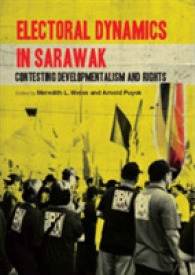Full Description
Die Beschäftigten an logistischen Engpässen wie Häfen und Flughäfen, die sich an Dreh- und Angelpunkten der globalisierten Wirtschaft befinden, sollten über eine große Verhandlungsmacht verfügen. Dieses Buch untersucht die räumlich-historische Geschichte der Logistik in Portugal und Brasilien und fragt, warum die Arbeitsbedingungen in Häfen und Flughäfen immer noch überwiegend prekär sind. Anhand eigener Feldforschung und qualitativer Studien analysiert Anne Engelhardt die Arbeit und das Leben der Arbeiter entlang materialistischer Theorieansätze zur sozialen Reproduktion, zum metabolischen Riss, zum Staat und zum Körper.
Contents
Acknowledgement
Abbreviations
1. Introduction
1.1 A Story of Four Chokepoints
1.2 Chokepoints Between "Magic Bullets" and "Hyper-Surveillance"
1.3 Selecting Brazilian and Portuguese Chokepoints
1.4 Fieldwork and Research Questions
1.5 Findings and Theoretical Approaches
1.6 Structure
2. Methodological Considerations
2.1 Ontological Atomism, External Relations, and Formal Comparison
2.1.1 Comparisons and Case Selection
2.1.2 Quality Criteria and Data Evaluation
2.2 Towards a Non-Dogmatic Marxist-Feminist Ontology
2.3 Epistemological parameters of Marxist-Feminism
2.4 Relational and Incorporated Comparison
2.5 Quality Criteria of Marxist Feminist Research
2.5.1 Reflexive and Democratic Thinking
2.5.2 Disclosing Power Structures
2.5.3 Reflexive and Activist Fieldwork
2.6 Survey, Sample, and Evaluation of Material
2.6.1 Qualitative Semi-Structured Interviews
2.6.2 Reflexions on the Interview Sample
2.6.3 Content Analysis, Coding and Retroduction
2.7 Concluding Points on Methodology
3. Logistics - "Go They Must"
3.1 Logistics in Capitalism
3.2 Critical Logistics
3.3 The "Line" between M-C-M'
3.4 The Commodity and its Use-Value
3.5 Transport as Commodity and Production Site
3.5.1 Between Economy's Appendix and (Renewed) Supply Chain Master
3.5.2 Regionalism and Changing Trade- and Transport Patterns
3.6 Turnover Time and Storage
3.7 Fixed and Circulating Capital
3.8 Workers' Struggles on the Lines between M-C-M'
3.9 Closing Remarks on Logistics
4. A Spatially Embedded History of Chokepoints
4.1 A History of Portuguese and Brazilian Ports
4.1.1 The Portuguese Empire and the Port of Lisbon
4.1.2 Colonialist Expansion: from Lisbon to Santos
4.1.3 The Port of Lisbon in the European Periphery
4.1.4 Final Remarks on the History of Brazilian and Portuguese Ports
4.2 An Economic History of Brazilian and Portuguese Airports
4.2.1 Neo/Colonial Traits of Aviation in Brazil
4.2.2 The Airport Santos Dumont
4.2.3 Portuguese Aviation: from Colonialism to Neoliberalism
4.2.4 Humberto Delgado Airport from Colonial War to Mass Tourism
4.2.5 Conclusion on Aviation
4.3 Final remarks on the History of Portuguese and Brazilian Chokepoints
5. The Social Reproduction Metabolism of Embodied Labour
5.1 Connecting Marxist-Feminism to Industrial Relations
5.2 The Body from the Lens of Social Reproduction Theory (SRT)
5.2.1 Class Position
5.2.2 Exploitation
5.2.3 Temporality
5.2.4 Spatiality
5.3 Social Reproduction Metabolism
5.4 Exploitation patterns
5.4.1 Masculinist Exploitation Patterns
5.4.2 Feminine Exploitation Patterns
5.4.3 Racialised Exploitation Patterns
5.4.4 Precarious Exploitation Patterns
5.5 Social Reproduction Metabolism as a Tug-Of-War
5.5.1 Temporal Conflicts of SRM
5.5.2 Spatial Conflicts of SRM
5.6 Concluding Remarks on Embodied Labour and SRM
6. Embodied Segregation and Exploitation at Chokepoints
6.1 Gendered Segregation in the Maritime and Port Sector
6.1.1 Intergenerational Male Family Ties in the Maritime Industry
6.1.2 Masculinist Exploitation Patterns at the Port
6.1.3 Female Workers within Masculinist Exploitation Patterns
6.2 Racialised Segregation in the Maritime and Port Sector
6.2.1 Racialised Exploitation Patterns in the Maritime and Port Sector
6.2.2 The Racialised History of Portuguese and Brazilian Maritime and Port Labour
6.2.3 Cultural Othering and Racialised Gender Biases
6.2.4 Reclaim Lashing: A Cross-Cutting International Campaign in a Racialised Sector
6.3 Conclusion: Divisions and Convergences in Port Labour
6.4 Gendered Segregation in Aviation
6.4.1 The Making of the Aerial Workforce
6.4.2 Feminine Exploitation Patterns in Aviation
6.4.3 "In Nobody's World": Invisible Feminised Airport Labour
6.4.4 Organising Obstacles for Embodied Feminised Labour
6.4.5 Aviation Labour and the ILO
6.5 Racialised Exploitation Patterns in Aviation: "White space" Up in the Air
6.5.1 FOC in Aviation
6.5.2 Racialised Cargo Handling
6.5.3 The Exclusive Struggle at the "White Space" in Brazil
6.5.4 Portugal's Aeronauts Started a Wave: European Strikes at Ryanair
6.6 Concluding Remarks on Segregation in Aviation
6.7 Conclusion: Embodied Segregation and Exploitation at Chokepoints
7. Precarious Embodied Exploitation
7.1 Health and Safety Conflicts at Chokepoints from a Historical Perspective
7.1.1 Health and Safety in the Maritime and Port Sector
7.1.2 Health and Safety in the Aviation and Airport Industry
7.2 Tasks in Today's Port and Aviation Industry
7.3 The Tug of War in the Metabolic Rift at Chokepoints
7.3.1 Temporal Conflicts at the Ports in Lisbon and Santos
7.3.2 Temporal Conflicts at the Airports Humberto Delgado and Santos Dumont
7.3.3 Spatial Conflicts at the Ports in Lisbon and Santos
7.3.4 Spatial Conflicts at the Airports Santos Dumont and Humberto Delgado
7.4 Concluding Remarks on Precarious Exploitation
8. The State and SRM at Chokepoints
8.1 Materialist State Theory
8.2 The Capitalist State and Authoritarian Neoliberalism
8.3 Authoritarian Practices in a Democratic Context
8.4 The Unruly Nature of Chokepoints
8.5 Authoritarian Scale Shifts and Up/Downscaling
8.6 Trade Unions, State, and Class Struggles
8.7 Concluding Remarks on the State
9. Chokepoints in Authoritarian (and) Neoliberal States
9.1 Remnants and Novelties of Authoritarian Practices
9.2 The Estado Novo in Brazil and Portugal
9.2.1 Initial Dockworkers' and Aviation Workers' Unionism in Brazil
9.2.2 The Estado Novo in Portugal
9.2.3 Corporatist Dockworkers' Union Structures and Unorganised Aviation Labour in Lisbon
9.3 The 1960s and Mid-1970s: Authoritarian and Illiberal Practices in Brazil and Portugal
9.3.1 Oppression of Unionised Santos' Dockworkers
9.3.2 Aviation Workers and the Battle for Aerobrás
9.3.3 Regaining Strength: Brazilian Aviation Workers in the 1970s and 1980s
9.3.4 Disruptive Struggles in Pre- and Post-Revolutionary Portugal
9.3.5 The Battle at Lisbon Airport: Harbingers of the Revolution
9.3.6 The Transition of Portugal Towards Democratic Parliamentarism
9.4 Authoritarian and Neoliberal Practices in the Brazilian Port and Airport Sector
9.4.1 Santos' Transformation from a Port City to a City with a Port
9.4.2 The Neoliberal Transformation of Port Labour in Santos
9.4.3 A Conflict on Temporal Autonomy in Santos
9.4.4 Neoliberal Practices Challenging Aviation Labour in Brazil
9.4.5 The Fatal Consequences of the Hub-Spoke System
9.4.6 The New Neoliberal Wave in Brazil
9.4.7 The Labour Reform of 2017 in Temporal and Spatial Conflicts
9.4.8 The General Strike in April 2017 and the Division of Workers
9.5 Authoritarian and Neoliberal Practices in the Portuguese Port and Airport Sector
9.5.1 Neoliberal Practices in the Port of Lisbon in the 1990s
9.5.2 Upscaling: from Liverpool to Lisbon: The Founding of the IDC
9.5.3 The Port of Lisbon Struggle on a European Scale Against "Self-Handling"
9.5.4 The Lisbon Port Struggle on a National Scale
9.5.5 Fighting Precarious Exploitation Patterns in the Port of Lisbon
9.5.6 International Solidarity - Upscaling of Struggles
9.5.7 Aviation Workers in Portugal against Subcontracting
9.5.8 Open Skies in the European Union and the Impact on TAP
9.5.9 The Struggle for Keeping TAP Public
9.6 Conclusion on State, Struggles, and Chokepoints
10. Conclusion
10.1 Part One: Logistics
10.2 Part Two: The Body and Social Reproduction Metabolism
10.3 Part Three: The State and Authoritarian Practices
10.4 Methodological Reflections on Limitations
10.5 A Future of Four Chokepoints
11. References
12. Appendix
Index








